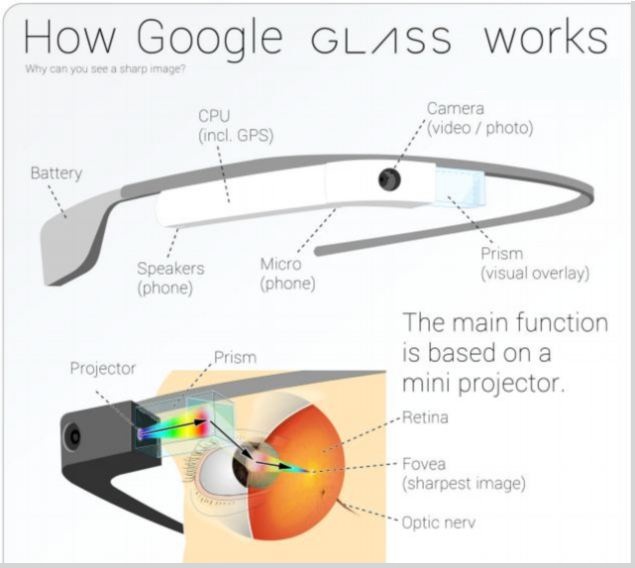-GOOGLE GLASSES LASIK WARNING:
"WHAT ARE GOOGLE GLASSES...AND...WHAT ARE THEIR LONG-TERM CONSEQUENCES ON A DEPENDENT SOCIETY?"
First...before we get into the "GOOGLE GLASSES" I think it's imperitively important to not this: Interesting don't you think, that ALL OF THE OPHTHALMOLOGISTS that held the "REFERENDUM" on the Emergency LASIK Ophthalmic Panel on April 25th, 2008 are ALL WEARING GLASSES...? Either A: LASIK didn't work for them and they regressed and are now back into glasses. Or B: They won't do LASIK on their own eyes!
Now that the first sets of Google Glass—those not hovering above the right eyes of Google employees—are infiltrating the world at large on the noses of normal people, anxieties about the dilemmas of ubiquitous wearable computers are quickly solidifying: manners are being debated, rules posted, laws considered. Those qualms are not new. In July of last year, a few months after the initial announcement of Google Glass, Steve Mann, a pioneer of wearable computers and a professor at the University of Toronto who had worn “a computer vision system of some kind for 34 years,” claimed that he was assaulted by McDonald’s employees in Paris, who tried to remove his EyeTap digital eyeglass, even though, as he noted, it was “permanently attached and does not come off my skull without special tools.” The device Mann was wearing is similar in appearance to Google Glass—remarkably so, given that it was originally designed in 1999. It is perceptibly bulkier and less elegant; the older, larger computer parts attached to the thin aluminum frame assert themselves more aggressively against the organic life-form behind them. It functions differently, although some of the applications are the same.
IMAGINE A WORLD...YOUR WORLD...RECORDED THROUGH "GOOGLE GLASSES!"
(WARNING: IF YOU HAD LASIK...
DO NOT WEAR THESE!)
While Google Glass is largely characterized by a small heads-up display that floats above the right eye and displays content like weather or directions—it is not an augmented-reality device—the EyeTap more directly mediates vision as an eyepiece. “That which the user looks at is processed by the EyeTap,” says a company Web page. “This allows the EyeTap to, under computer control, augment, diminish, or otherwise alter a user’s visual perception of their environment.” Mann’s permanent attachment to his device is possibly more profound than the simple physical connection between flesh and metal: when it was forcibly removed and damaged at an airport in 2002, Mann “fell at least twice in the airport” and “boarded the plane in a wheelchair.” Afterward, the New York Times reported:
Since losing the use of his vision system and computer memory several weeks ago, he said, he cannot concentrate and is behaving differently. He is now undergoing tests to determine whether his brain has been affected by the sudden detachment from the technology.
HOW DO "GOOGLE GLASSES WORK?"
BUT...THOSE OF YOU WHO UNDERWENT IRREVERSIBLE LASIK EYE SURGERY NOW HAVE A PERMANENT FLAP THAT COULD COME OFF AT ANY TIME...THEREFORE, ARE WARNED TO NOT USE GOOGLE GLASSES:
"Google Issues Warnings For Google Glass. Even Google know that flap never heals."
"If you’ve had Lasik surgery, ask your doctor
about risks of eye impact damage before using Glass."
"The company goes on to advise people who have had
Lasik eye surgery to avoid wearing the device. If you’re really eager to try,
then Google recommends that you go to your doctor for final approval, but given
the fact that this is such early adoption, they probably won’t know anything
about it yet."
"If you’ve had Lasik surgery, ask your doctor about
risks of eye impact damage before using Glass."
Google Glass arrives at a time when two polar opposite trends are playing out against each other in pop culture: part time glasses for those who don’t need them, in the form of a fashion accessory, are in. Full time glasses for those who do need them, thanks to LASIK, are out. The paradoxical nature of those two trends leaves Google launching a glasses-based wearable computing product at a time when the public doesn’t know what it thinks of glasses in general, and it’s not clear which trend will prevail when it comes to popular sentiment toward the new technology.







Did some one forget that Human beings usually have two eyes which are inextricably linked? Why would any one think that a monocular device over time wouldn't do some damage to that system?
ReplyDelete